Philosophy 2: A Comparison of Jaspers and Kant's Philosophies
VerifiedAdded on 2022/09/14
|7
|1373
|17
Essay
AI Summary
This essay provides a comparative analysis of the philosophical perspectives of Karl Jaspers and Immanuel Kant. It begins by highlighting Jaspers' views on world views, rationality, and limit conditions, contrasting them with Kant's transcendental ideas. The essay explores the points of convergence and divergence between their philosophies, specifically focusing on their interpretations of transcendental philosophy and its role in understanding human reason and experience. It examines how Jaspers adapted Kant's ideas, transforming the transcendental into his concept of transcendence. The essay also addresses potential criticisms and debates surrounding Jaspers' interpretation of Kant, concluding with a reflection on the ongoing philosophical discussions and the potential for further evolution in their respective viewpoints. The essay also includes references to relevant literature supporting the analysis.
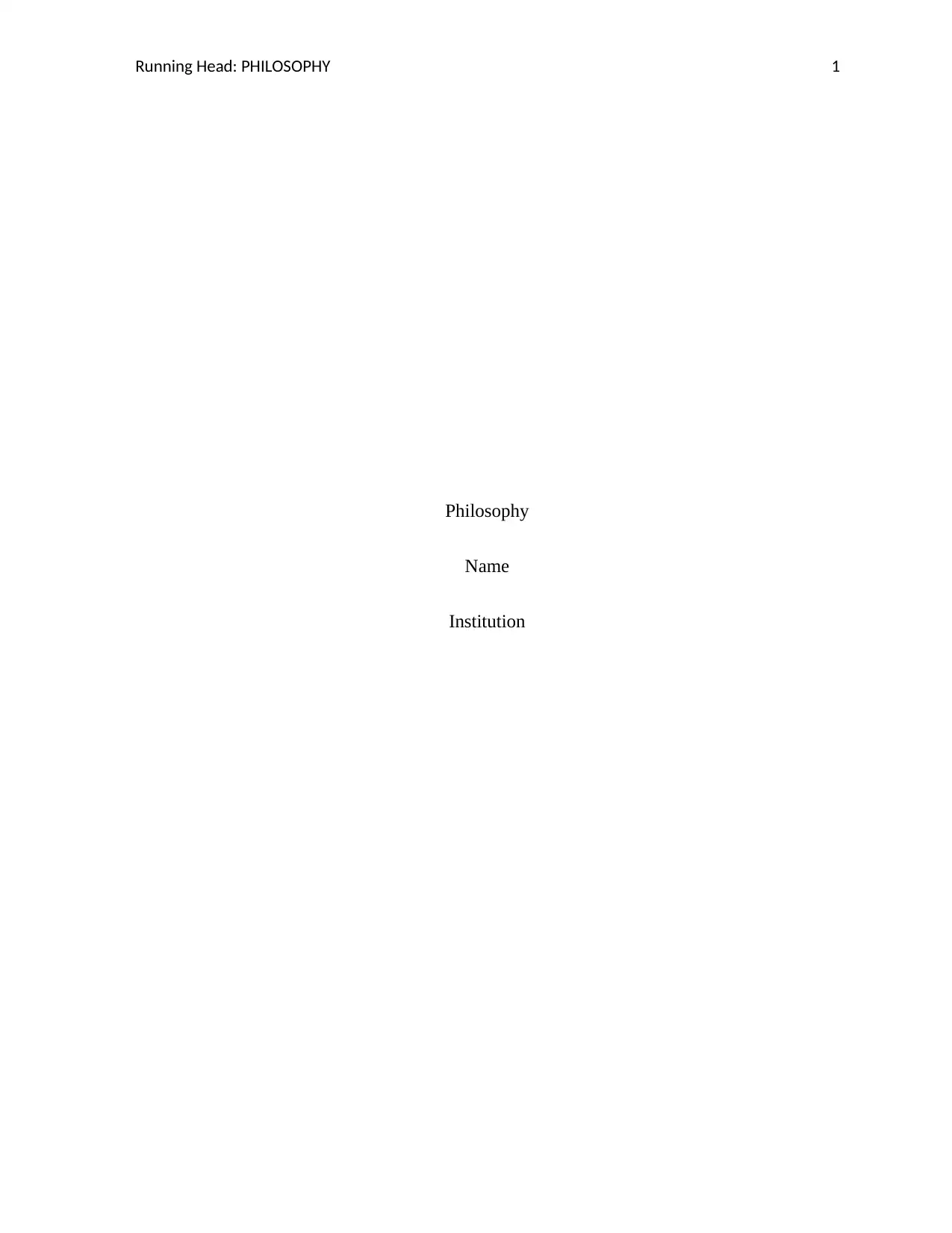
Running Head: PHILOSOPHY 1
Philosophy
Name
Institution
Philosophy
Name
Institution
Paraphrase This Document
Need a fresh take? Get an instant paraphrase of this document with our AI Paraphraser
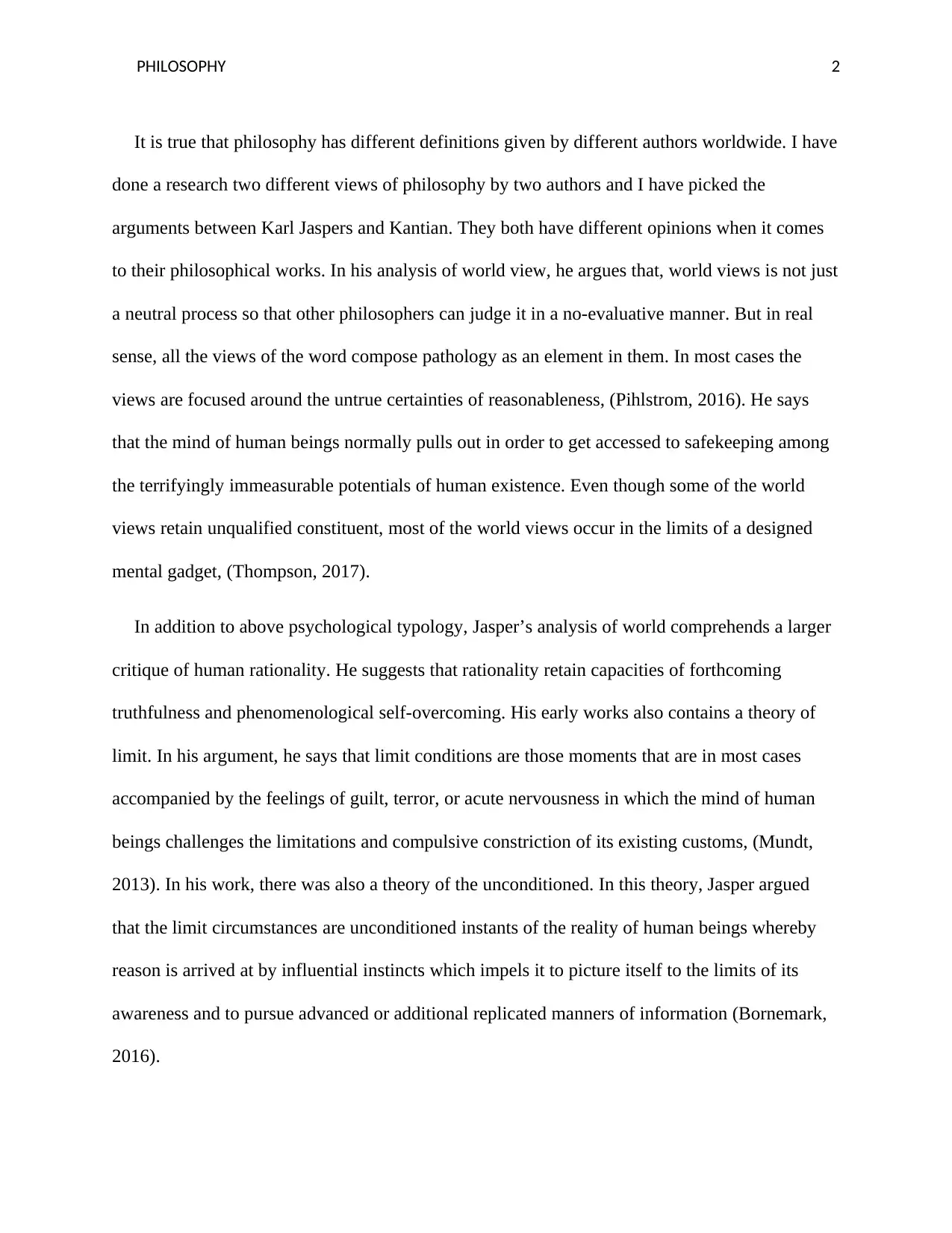
PHILOSOPHY 2
It is true that philosophy has different definitions given by different authors worldwide. I have
done a research two different views of philosophy by two authors and I have picked the
arguments between Karl Jaspers and Kantian. They both have different opinions when it comes
to their philosophical works. In his analysis of world view, he argues that, world views is not just
a neutral process so that other philosophers can judge it in a no-evaluative manner. But in real
sense, all the views of the word compose pathology as an element in them. In most cases the
views are focused around the untrue certainties of reasonableness, (Pihlstrom, 2016). He says
that the mind of human beings normally pulls out in order to get accessed to safekeeping among
the terrifyingly immeasurable potentials of human existence. Even though some of the world
views retain unqualified constituent, most of the world views occur in the limits of a designed
mental gadget, (Thompson, 2017).
In addition to above psychological typology, Jasper’s analysis of world comprehends a larger
critique of human rationality. He suggests that rationality retain capacities of forthcoming
truthfulness and phenomenological self-overcoming. His early works also contains a theory of
limit. In his argument, he says that limit conditions are those moments that are in most cases
accompanied by the feelings of guilt, terror, or acute nervousness in which the mind of human
beings challenges the limitations and compulsive constriction of its existing customs, (Mundt,
2013). In his work, there was also a theory of the unconditioned. In this theory, Jasper argued
that the limit circumstances are unconditioned instants of the reality of human beings whereby
reason is arrived at by influential instincts which impels it to picture itself to the limits of its
awareness and to pursue advanced or additional replicated manners of information (Bornemark,
2016).
It is true that philosophy has different definitions given by different authors worldwide. I have
done a research two different views of philosophy by two authors and I have picked the
arguments between Karl Jaspers and Kantian. They both have different opinions when it comes
to their philosophical works. In his analysis of world view, he argues that, world views is not just
a neutral process so that other philosophers can judge it in a no-evaluative manner. But in real
sense, all the views of the word compose pathology as an element in them. In most cases the
views are focused around the untrue certainties of reasonableness, (Pihlstrom, 2016). He says
that the mind of human beings normally pulls out in order to get accessed to safekeeping among
the terrifyingly immeasurable potentials of human existence. Even though some of the world
views retain unqualified constituent, most of the world views occur in the limits of a designed
mental gadget, (Thompson, 2017).
In addition to above psychological typology, Jasper’s analysis of world comprehends a larger
critique of human rationality. He suggests that rationality retain capacities of forthcoming
truthfulness and phenomenological self-overcoming. His early works also contains a theory of
limit. In his argument, he says that limit conditions are those moments that are in most cases
accompanied by the feelings of guilt, terror, or acute nervousness in which the mind of human
beings challenges the limitations and compulsive constriction of its existing customs, (Mundt,
2013). In his work, there was also a theory of the unconditioned. In this theory, Jasper argued
that the limit circumstances are unconditioned instants of the reality of human beings whereby
reason is arrived at by influential instincts which impels it to picture itself to the limits of its
awareness and to pursue advanced or additional replicated manners of information (Bornemark,
2016).
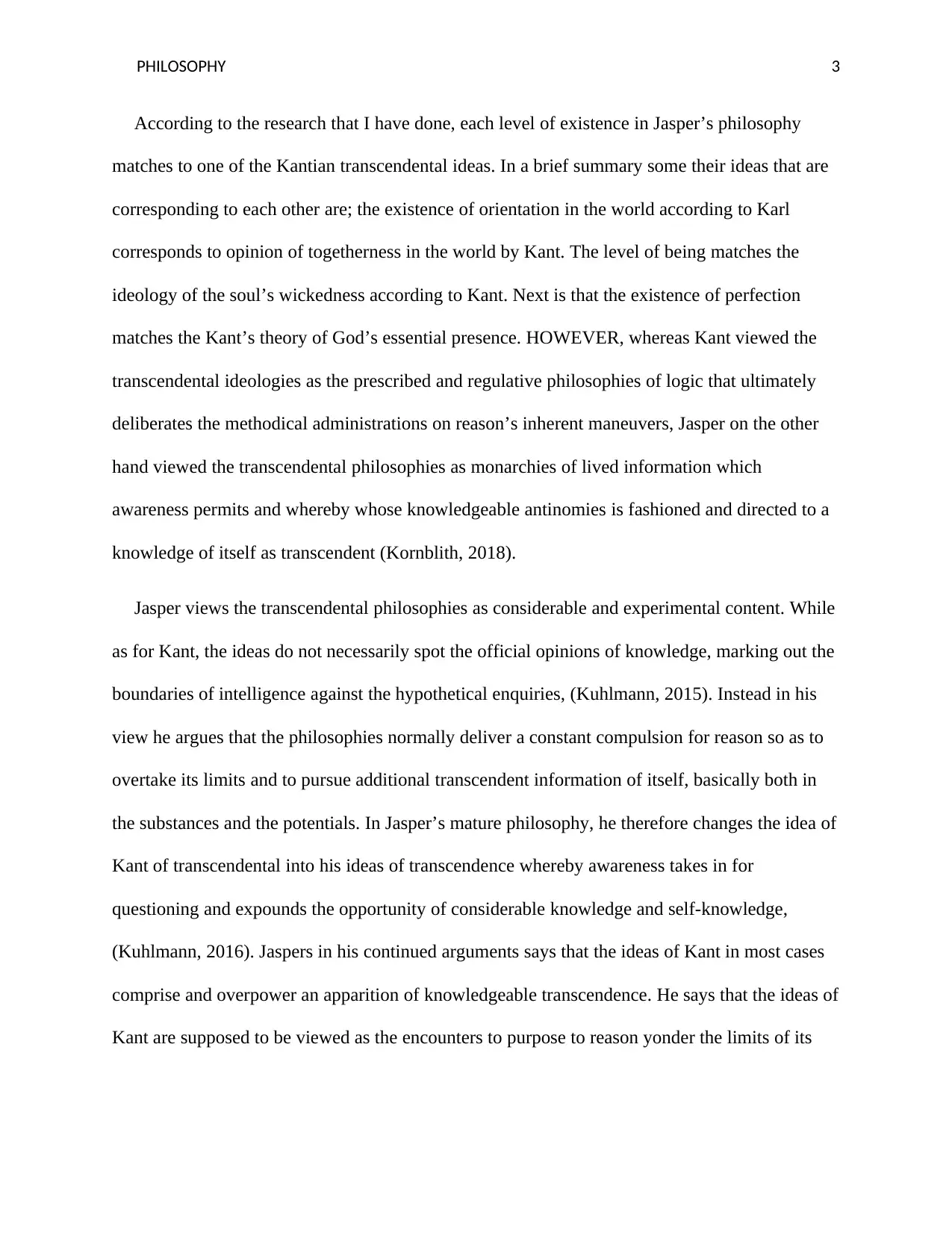
PHILOSOPHY 3
According to the research that I have done, each level of existence in Jasper’s philosophy
matches to one of the Kantian transcendental ideas. In a brief summary some their ideas that are
corresponding to each other are; the existence of orientation in the world according to Karl
corresponds to opinion of togetherness in the world by Kant. The level of being matches the
ideology of the soul’s wickedness according to Kant. Next is that the existence of perfection
matches the Kant’s theory of God’s essential presence. HOWEVER, whereas Kant viewed the
transcendental ideologies as the prescribed and regulative philosophies of logic that ultimately
deliberates the methodical administrations on reason’s inherent maneuvers, Jasper on the other
hand viewed the transcendental philosophies as monarchies of lived information which
awareness permits and whereby whose knowledgeable antinomies is fashioned and directed to a
knowledge of itself as transcendent (Kornblith, 2018).
Jasper views the transcendental philosophies as considerable and experimental content. While
as for Kant, the ideas do not necessarily spot the official opinions of knowledge, marking out the
boundaries of intelligence against the hypothetical enquiries, (Kuhlmann, 2015). Instead in his
view he argues that the philosophies normally deliver a constant compulsion for reason so as to
overtake its limits and to pursue additional transcendent information of itself, basically both in
the substances and the potentials. In Jasper’s mature philosophy, he therefore changes the idea of
Kant of transcendental into his ideas of transcendence whereby awareness takes in for
questioning and expounds the opportunity of considerable knowledge and self-knowledge,
(Kuhlmann, 2016). Jaspers in his continued arguments says that the ideas of Kant in most cases
comprise and overpower an apparition of knowledgeable transcendence. He says that the ideas of
Kant are supposed to be viewed as the encounters to purpose to reason yonder the limits of its
According to the research that I have done, each level of existence in Jasper’s philosophy
matches to one of the Kantian transcendental ideas. In a brief summary some their ideas that are
corresponding to each other are; the existence of orientation in the world according to Karl
corresponds to opinion of togetherness in the world by Kant. The level of being matches the
ideology of the soul’s wickedness according to Kant. Next is that the existence of perfection
matches the Kant’s theory of God’s essential presence. HOWEVER, whereas Kant viewed the
transcendental ideologies as the prescribed and regulative philosophies of logic that ultimately
deliberates the methodical administrations on reason’s inherent maneuvers, Jasper on the other
hand viewed the transcendental philosophies as monarchies of lived information which
awareness permits and whereby whose knowledgeable antinomies is fashioned and directed to a
knowledge of itself as transcendent (Kornblith, 2018).
Jasper views the transcendental philosophies as considerable and experimental content. While
as for Kant, the ideas do not necessarily spot the official opinions of knowledge, marking out the
boundaries of intelligence against the hypothetical enquiries, (Kuhlmann, 2015). Instead in his
view he argues that the philosophies normally deliver a constant compulsion for reason so as to
overtake its limits and to pursue additional transcendent information of itself, basically both in
the substances and the potentials. In Jasper’s mature philosophy, he therefore changes the idea of
Kant of transcendental into his ideas of transcendence whereby awareness takes in for
questioning and expounds the opportunity of considerable knowledge and self-knowledge,
(Kuhlmann, 2016). Jaspers in his continued arguments says that the ideas of Kant in most cases
comprise and overpower an apparition of knowledgeable transcendence. He says that the ideas of
Kant are supposed to be viewed as the encounters to purpose to reason yonder the limits of its
⊘ This is a preview!⊘
Do you want full access?
Subscribe today to unlock all pages.

Trusted by 1+ million students worldwide
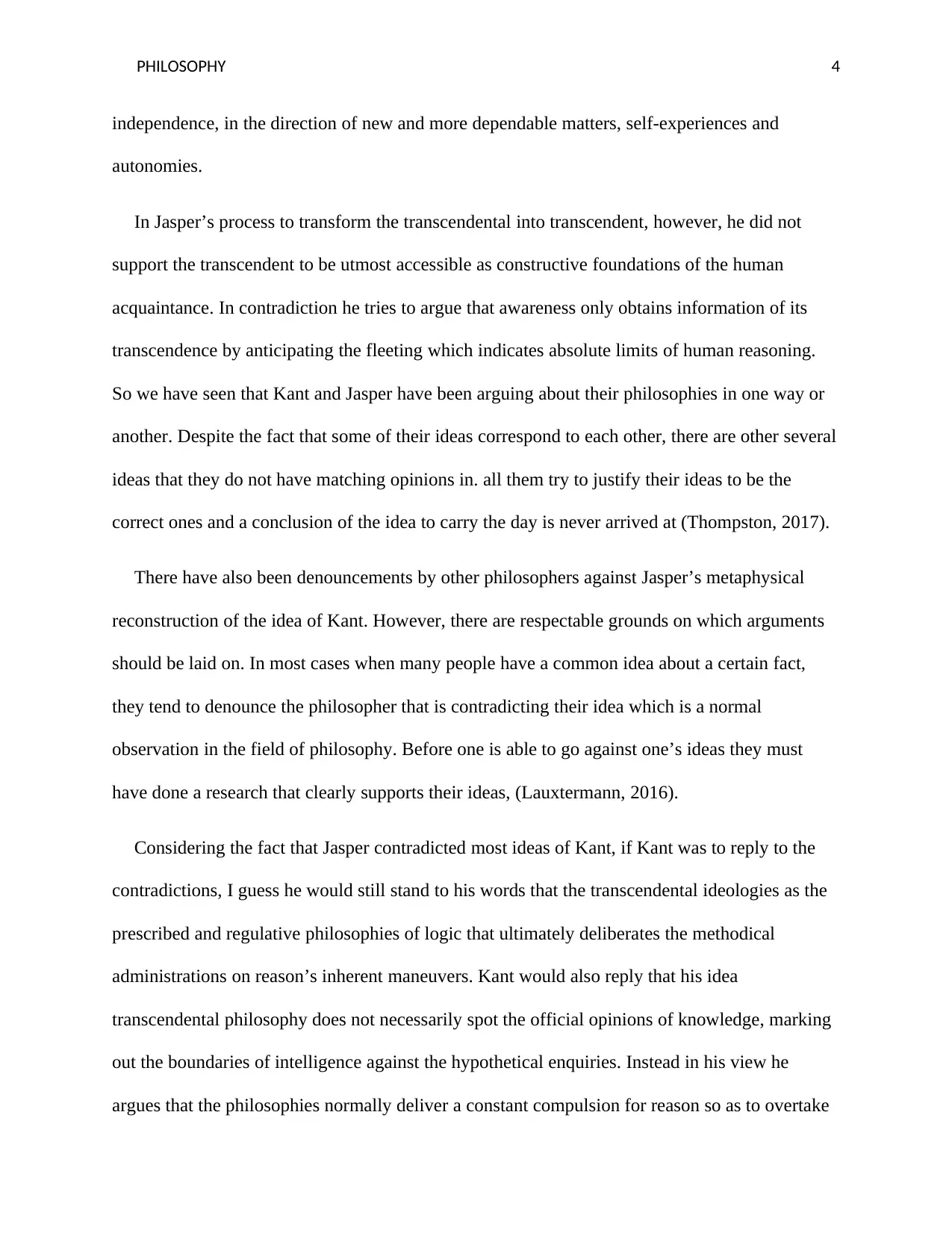
PHILOSOPHY 4
independence, in the direction of new and more dependable matters, self-experiences and
autonomies.
In Jasper’s process to transform the transcendental into transcendent, however, he did not
support the transcendent to be utmost accessible as constructive foundations of the human
acquaintance. In contradiction he tries to argue that awareness only obtains information of its
transcendence by anticipating the fleeting which indicates absolute limits of human reasoning.
So we have seen that Kant and Jasper have been arguing about their philosophies in one way or
another. Despite the fact that some of their ideas correspond to each other, there are other several
ideas that they do not have matching opinions in. all them try to justify their ideas to be the
correct ones and a conclusion of the idea to carry the day is never arrived at (Thompston, 2017).
There have also been denouncements by other philosophers against Jasper’s metaphysical
reconstruction of the idea of Kant. However, there are respectable grounds on which arguments
should be laid on. In most cases when many people have a common idea about a certain fact,
they tend to denounce the philosopher that is contradicting their idea which is a normal
observation in the field of philosophy. Before one is able to go against one’s ideas they must
have done a research that clearly supports their ideas, (Lauxtermann, 2016).
Considering the fact that Jasper contradicted most ideas of Kant, if Kant was to reply to the
contradictions, I guess he would still stand to his words that the transcendental ideologies as the
prescribed and regulative philosophies of logic that ultimately deliberates the methodical
administrations on reason’s inherent maneuvers. Kant would also reply that his idea
transcendental philosophy does not necessarily spot the official opinions of knowledge, marking
out the boundaries of intelligence against the hypothetical enquiries. Instead in his view he
argues that the philosophies normally deliver a constant compulsion for reason so as to overtake
independence, in the direction of new and more dependable matters, self-experiences and
autonomies.
In Jasper’s process to transform the transcendental into transcendent, however, he did not
support the transcendent to be utmost accessible as constructive foundations of the human
acquaintance. In contradiction he tries to argue that awareness only obtains information of its
transcendence by anticipating the fleeting which indicates absolute limits of human reasoning.
So we have seen that Kant and Jasper have been arguing about their philosophies in one way or
another. Despite the fact that some of their ideas correspond to each other, there are other several
ideas that they do not have matching opinions in. all them try to justify their ideas to be the
correct ones and a conclusion of the idea to carry the day is never arrived at (Thompston, 2017).
There have also been denouncements by other philosophers against Jasper’s metaphysical
reconstruction of the idea of Kant. However, there are respectable grounds on which arguments
should be laid on. In most cases when many people have a common idea about a certain fact,
they tend to denounce the philosopher that is contradicting their idea which is a normal
observation in the field of philosophy. Before one is able to go against one’s ideas they must
have done a research that clearly supports their ideas, (Lauxtermann, 2016).
Considering the fact that Jasper contradicted most ideas of Kant, if Kant was to reply to the
contradictions, I guess he would still stand to his words that the transcendental ideologies as the
prescribed and regulative philosophies of logic that ultimately deliberates the methodical
administrations on reason’s inherent maneuvers. Kant would also reply that his idea
transcendental philosophy does not necessarily spot the official opinions of knowledge, marking
out the boundaries of intelligence against the hypothetical enquiries. Instead in his view he
argues that the philosophies normally deliver a constant compulsion for reason so as to overtake
Paraphrase This Document
Need a fresh take? Get an instant paraphrase of this document with our AI Paraphraser
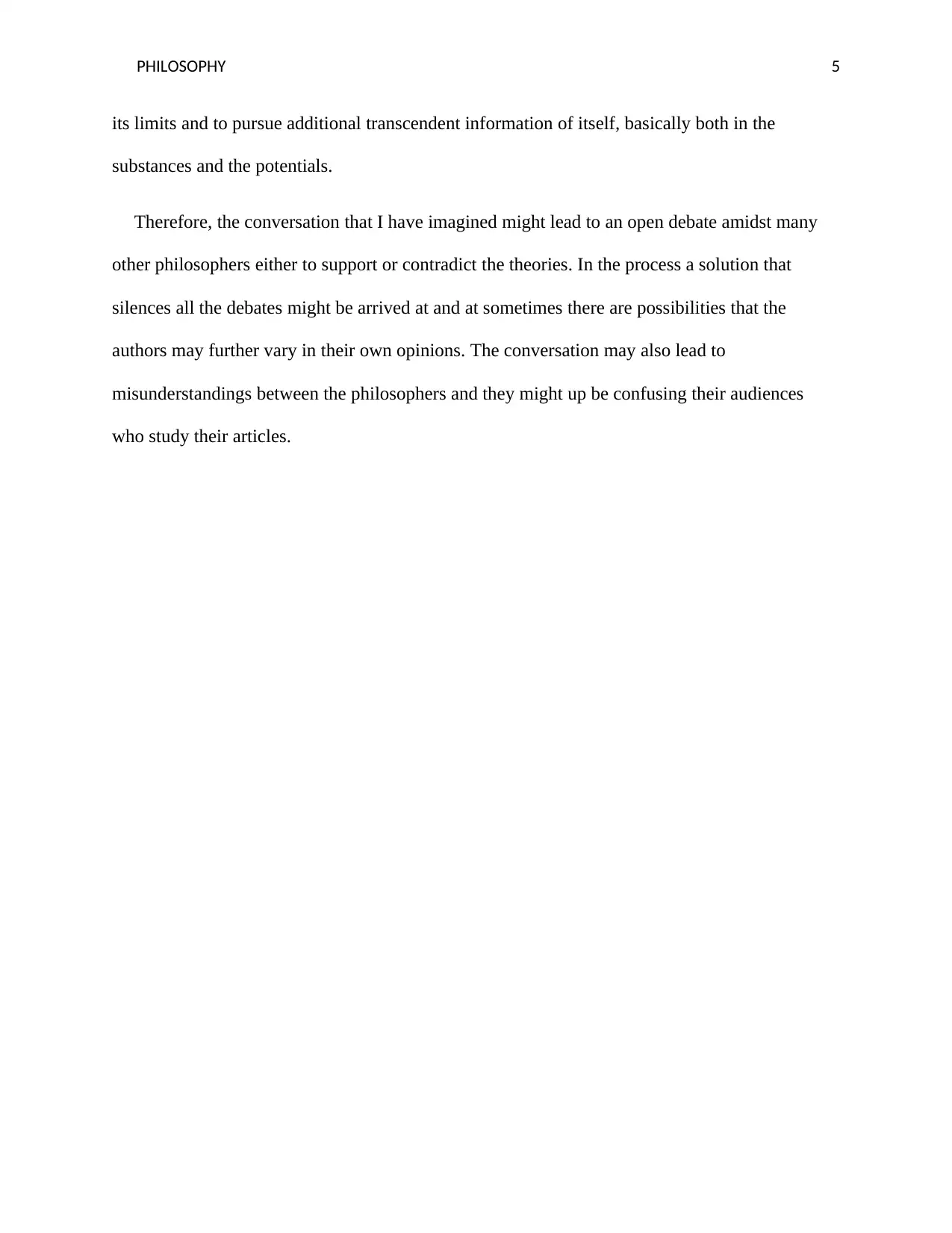
PHILOSOPHY 5
its limits and to pursue additional transcendent information of itself, basically both in the
substances and the potentials.
Therefore, the conversation that I have imagined might lead to an open debate amidst many
other philosophers either to support or contradict the theories. In the process a solution that
silences all the debates might be arrived at and at sometimes there are possibilities that the
authors may further vary in their own opinions. The conversation may also lead to
misunderstandings between the philosophers and they might up be confusing their audiences
who study their articles.
its limits and to pursue additional transcendent information of itself, basically both in the
substances and the potentials.
Therefore, the conversation that I have imagined might lead to an open debate amidst many
other philosophers either to support or contradict the theories. In the process a solution that
silences all the debates might be arrived at and at sometimes there are possibilities that the
authors may further vary in their own opinions. The conversation may also lead to
misunderstandings between the philosophers and they might up be confusing their audiences
who study their articles.
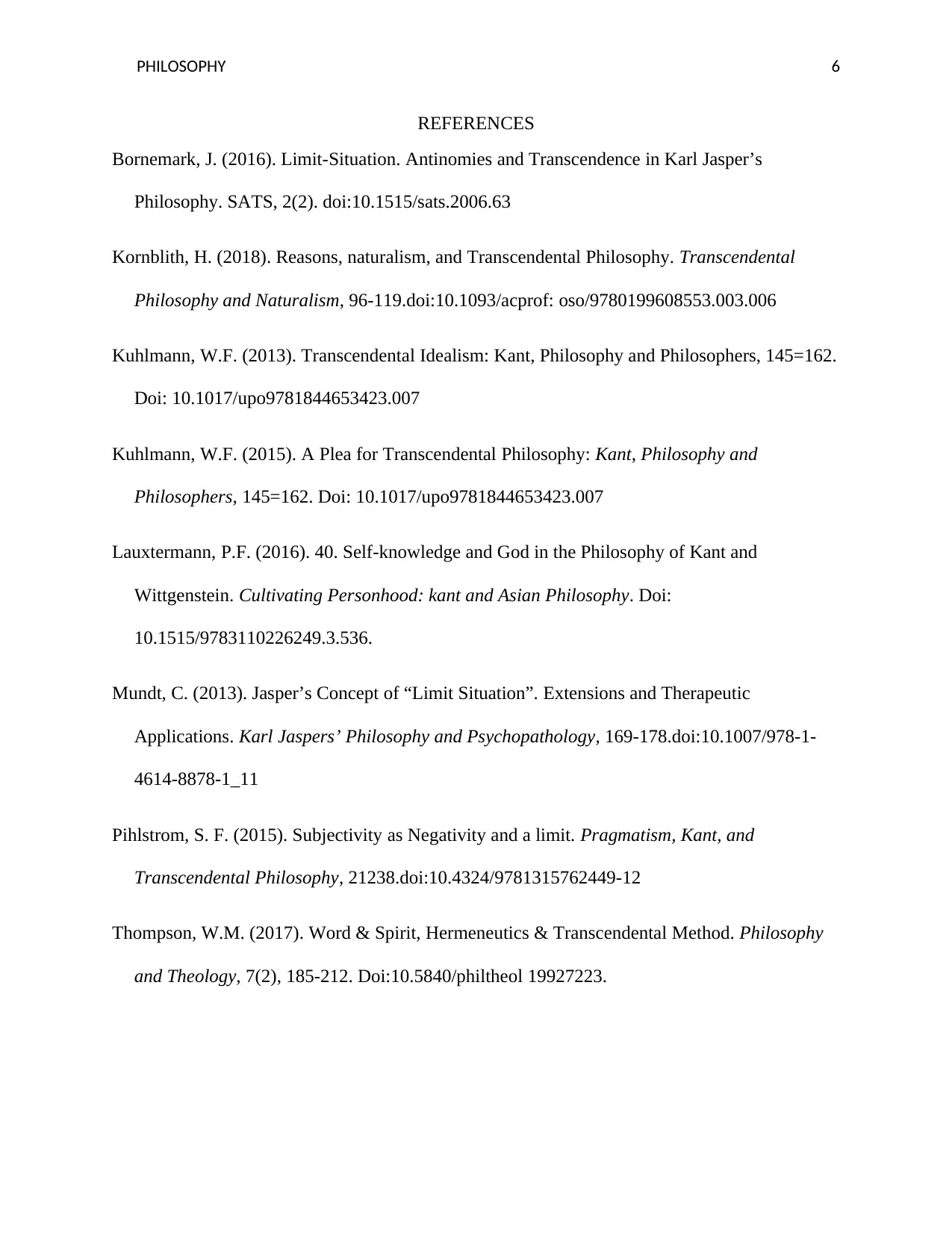
PHILOSOPHY 6
REFERENCES
Bornemark, J. (2016). Limit-Situation. Antinomies and Transcendence in Karl Jasper’s
Philosophy. SATS, 2(2). doi:10.1515/sats.2006.63
Kornblith, H. (2018). Reasons, naturalism, and Transcendental Philosophy. Transcendental
Philosophy and Naturalism, 96-119.doi:10.1093/acprof: oso/9780199608553.003.006
Kuhlmann, W.F. (2013). Transcendental Idealism: Kant, Philosophy and Philosophers, 145=162.
Doi: 10.1017/upo9781844653423.007
Kuhlmann, W.F. (2015). A Plea for Transcendental Philosophy: Kant, Philosophy and
Philosophers, 145=162. Doi: 10.1017/upo9781844653423.007
Lauxtermann, P.F. (2016). 40. Self-knowledge and God in the Philosophy of Kant and
Wittgenstein. Cultivating Personhood: kant and Asian Philosophy. Doi:
10.1515/9783110226249.3.536.
Mundt, C. (2013). Jasper’s Concept of “Limit Situation”. Extensions and Therapeutic
Applications. Karl Jaspers’ Philosophy and Psychopathology, 169-178.doi:10.1007/978-1-
4614-8878-1_11
Pihlstrom, S. F. (2015). Subjectivity as Negativity and a limit. Pragmatism, Kant, and
Transcendental Philosophy, 21238.doi:10.4324/9781315762449-12
Thompson, W.M. (2017). Word & Spirit, Hermeneutics & Transcendental Method. Philosophy
and Theology, 7(2), 185-212. Doi:10.5840/philtheol 19927223.
REFERENCES
Bornemark, J. (2016). Limit-Situation. Antinomies and Transcendence in Karl Jasper’s
Philosophy. SATS, 2(2). doi:10.1515/sats.2006.63
Kornblith, H. (2018). Reasons, naturalism, and Transcendental Philosophy. Transcendental
Philosophy and Naturalism, 96-119.doi:10.1093/acprof: oso/9780199608553.003.006
Kuhlmann, W.F. (2013). Transcendental Idealism: Kant, Philosophy and Philosophers, 145=162.
Doi: 10.1017/upo9781844653423.007
Kuhlmann, W.F. (2015). A Plea for Transcendental Philosophy: Kant, Philosophy and
Philosophers, 145=162. Doi: 10.1017/upo9781844653423.007
Lauxtermann, P.F. (2016). 40. Self-knowledge and God in the Philosophy of Kant and
Wittgenstein. Cultivating Personhood: kant and Asian Philosophy. Doi:
10.1515/9783110226249.3.536.
Mundt, C. (2013). Jasper’s Concept of “Limit Situation”. Extensions and Therapeutic
Applications. Karl Jaspers’ Philosophy and Psychopathology, 169-178.doi:10.1007/978-1-
4614-8878-1_11
Pihlstrom, S. F. (2015). Subjectivity as Negativity and a limit. Pragmatism, Kant, and
Transcendental Philosophy, 21238.doi:10.4324/9781315762449-12
Thompson, W.M. (2017). Word & Spirit, Hermeneutics & Transcendental Method. Philosophy
and Theology, 7(2), 185-212. Doi:10.5840/philtheol 19927223.
⊘ This is a preview!⊘
Do you want full access?
Subscribe today to unlock all pages.

Trusted by 1+ million students worldwide

PHILOSOPHY 7
1 out of 7
Related Documents
Your All-in-One AI-Powered Toolkit for Academic Success.
+13062052269
info@desklib.com
Available 24*7 on WhatsApp / Email
![[object Object]](/_next/static/media/star-bottom.7253800d.svg)
Unlock your academic potential
Copyright © 2020–2026 A2Z Services. All Rights Reserved. Developed and managed by ZUCOL.





